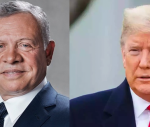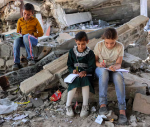You are here
Putin’s war and the German economic model
Jun 16,2022 - Last updated at Jun 16,2022
MUNICH — Will Germany’s economic model survive Russian President Vladimir Putin’s war on Ukraine? As I noted in a recent talk at Harvard University, answering that question requires revisiting recent economic history.
Germany’s economy was transformed after the fall of communism in 1989. Liberalisation of trade with the country’s eastern neighbours had three profound effects at home. First, it led to de-centralised wage bargaining. Second, it had a flattening effect on hierarchical management in German firms. And third, it extended German production networks into Central and Eastern Europe.
On the first count, the opening of ex-communist Europe — where labour costs were lower — changed the power equilibrium between Germany’s trade unions and employers’ federation. With the loss of union bargaining power, wage negotiations shifted from the national level to the firm level.
Owing to this new structural wage restraint (the so-called Lohnzurückhaltung), unit labour costs in Germany declined by 30 per cent between 1995 and 2012. Germany was the only country in Europe to experience such declines. While the 2002-05 Hartz labour-market reforms are often blamed for reducing German wages, the data indicate that they played no role in this development.
The opening of the ex-communist countries also introduced de-centralised management. As trade became more internationalised and competitive, innovation and the generation of new ideas became more important. To encourage more creativity among workers, German firms delegated decision-making power to lower levels of management.
This approach proved highly effective. Germany’s business culture increasingly championed quality, and empowering lower levels of management led firms to introduce more products that customers appreciated. The typical (median) German firm that embraced decentralised management increased its export-market share by a factor of three, while firms that stuck with centralised management generally recorded no such gains.
Finally, the opening of ex-communist Europe led to expanded production networks, which reduced costs and helped Germany deal with a severe skills shortage. Germany’s eastern neighbours offered a large pool of skilled workers, particularly engineers. In 1998, 16 per cent of the these countries’ populations had university degrees, compared to 15 per cent of Germans.
Moreover, the growth of Germany’s human-capital stock (based on measures across five categories of educational attainment) had slowed to an annual rate of 0.18 per cent in the 1990s, compared to 0.75 per cent in the 1980s. Thus, when German firms invested in Central and Eastern Europe, they employed three times as many people with academic degrees and 11 per cent more research personnel in their subsidiaries than in their parent firms.
By the late 2000s, the resulting supply chains had reduced costs and increased productivity in German multinational firms by over 20 per cent. Germany went from being the sick man of Europe in the 1990s to the economic powerhouse that it is today.
Will these economic arrangements survive Russia’s invasion of Ukraine? To answer that, it helps to revisit the period following the 2008 global financial crisis. While transnational supply chains were a major engine of globalisation after the fall of communism, and especially after China’s entry into the World Trade Organisation in 2001, they stopped expanding after 2008. Increased global uncertainty led to an accelerating trend of reshoring to high-income countries, including Germany. The risk of non-delivery for key inputs made firms in high-income countries reassess their production networks.
While the global financial crisis ended hyper-globalisation, the COVID-19 pandemic seems to have triggered de-globalisation. The coronavirus introduced an unprecedented degree of global uncertainty, compounding the legacy effects of the 2008 shock. Kemal Kilic of LMU Munich and I estimate that COVID-19 has reduced global supply chains by 35 per cent, measured by imported inputs from developing countries as a share of total inputs.
Now, Putin’s war is accelerating the deglobalisation that COVID-19 started. The war has sent shockwaves throughout the world economy and further increased global uncertainty. Worse, Russia’s aggression seems to be just one violent manifestation of a broader authoritarian trend.
A world of increasingly assertive autocracies is hardly conducive to trade, global supply chains, and foreign direct investment. Recent moves by China are particularly worrying. China has sanctioned imports from Lithuania in retaliation for that country hosting a Taiwanese Representative Office, and it has imposed tariffs on imports from Australia after Australian officials criticised Chinese stonewalling in the investigation of the pandemic’s origins.
Unfortunately, the weaponisation of trade has become all too common and, along with the shock from Putin’s war and the continuing uncertainty from the pandemic, will prolong the disruption of supply chains. The longer these disruptions last, the more likely it is that firms will reorganise their supply chains altogether. US Secretary of the Treasury Janet Yellen has already suggested that “friend-shoring” should be added to the list of strategic options, alongside reshoring and onshoring. In Germany, friend-shoring is already underway. According to a survey by the Ifo Institute, 50 per cent of German companies with supply chains in China are now rethinking their operations.
The German economic model is not dead yet. But its high dependence on international trade implies that today’s changing economic and geopolitical environment will confront Germany with greater challenges compared to most other developed countries. The best way for Germany to sustain its post-Cold War economic model is to diversify its trading relationships so that it is no longer overly exposed to instability in a particular country or region.
Dalia Marin, professor of International Economics at the School of Management of the Technical University of Munich, is a research fellow at the Centre for Economic Policy Research and non-resident fellow at Bruegel. © Project Syndicate 1995–2022













